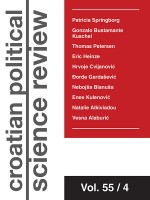Political Unity and the “Existential Meaning” of Conflict. On Carl Schmitt’s The Concept of the Political (with some remarks on The Dreyfus Affair in Hannah Arendt’s The Origins of Totalitarianism)
Political Unity and the “Existential Meaning” of Conflict. On Carl Schmitt’s The Concept of the Political (with some remarks on The Dreyfus Affair in Hannah Arendt’s The Origins of Totalitarianism)
Author(s): Thomas PetersenSubject(s): Political Philosophy, 19th Century Philosophy, Government/Political systems, Political economy
Published by: Fakultet političkih znanosti u Zagrebu
Keywords: Carl Schmitt; Political; Friend-Enemy Distinction; Conflict; Liberalism; Hannah Arendt; Dreyfus Affair;
Summary/Abstract: The article deals with the conflict as an indispensable element of democracy and politics from the perspective of Carl Schmitt’s concept of the political. According to Schmitt, the specific criterion of the political is to be found in the friend-enemy distinction. Denoting the utmost degree of association and dissociation, it corresponds to other antitheses (good-evil, beautiful-ugly, profitable-non-profitable, etc.), but is independent of them and should not be mistaken for them. Understood in this way, the political for Schmitt has an existential meaning, as it characterizes human life as such and as conflict cannot be solved in advance through some general norm or by a neutral third party. Although Schmitt’s definition seems to limit the proper phenomenon of the political to the state – which as political unity monopolizes the friend-enemy relationship and excludes enmity from its domestic affairs – the author finds in Schmitt’s “secondary concepts of the political” the possibility to think the conflict as the principle of domestic politics as well. This would mean to accept antagonism as inevitable and legitimate, without moral or other disqualification of the opponent, and to subdue conflict to the rules of political quarrel and debate. In the second part of the article, the author discusses Schmitt’s critique of liberalism. Although at first sight liberalism seems to be a negation of the political, in the last instance it not only fails to elude the political, but exacerbates and intensifies the conflict. By presenting its claims as universal, it disavows its adversaries as “enemies of humanity”, falling in this way victim to political hypocrisies. In the last part of the article, the author considers some similarities between Schmitt’s and Hannah Arendt’s understanding of the political. Despite all differences between them, these can be noticed in Arendt’s treatment of the Dreyfus Affair in the Origins of Totalitarianism, where she makes clear that conflict is not only a threat to the “political entity”, but can also be the way in which that entity is saved.
Journal: Politička Misao
- Issue Year: LV/2018
- Issue No: 04
- Page Range: 59-72
- Page Count: 14
- Language: English

